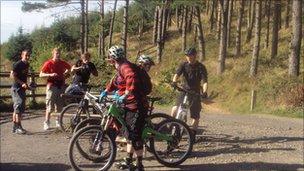Afan Valley moves from mining to mountain biking
- Published
Pedal power brings new life to Afan Valley in Wales
An area of south Wales which was devastated by pit closures has been transformed into one of the best mountain biking areas in the world.
Once it was pit wheels which drove the economy of the Afan Valley, now it is bicycle wheels.
The coal mines were the major employers in the area until the last one closed in 1985, leaving thousands out of work and turning a string of bustling pit villages into a ghost valley.
But since the first official trail was built thanks to £1m from the Welsh Assembly Government, over the last seven years area the Afan Forest Park has been revitalised as a tourist destination, attracting more than 100,000 people each year.
"We get visitors from all over the world," said Dick Wagstaff, a forestry ranger employed by the local council Port Talbot, who has watched the industry develop.
"Ten years ago a group of mountain bikers got together and wanted to build a mountain bike trail. The first one took about a year. Now there are four."
Some of the trails are built on old slag heaps and coal can be seen strewn across the paths.
The bikers' cafe is right next to the mining museum and former pit workers have embraced the new visitors.
Former miner Desmond Philips, who is 81, still goes for walks close to the bike trails.
He said: "It's lovely to see life back in the valley. It has been dead for so long. Though I never imagined this area would end up as one of the top destinations for mountain bikers. It had gone right down really."
It costs the Forestry Commission more than £100,000 a year to maintain the trails which are all free to ride.
The commission believes its investment is rewarded by the flourishing businesses which have sprung up connected to mountain biking. Former mining pubs and welfare institutes have been turned in to bed and breakfasts and self-catering accommodation.
It is estimated the sport pumps up to £3m a year into the local economy, and it is hoped that figure will grow as more trails are built.
Hayley Phillips began her business by renting out a cottage to mountain bikers, and it is now full most weekends.
That encouraged her to take a gamble with a new property and convert it in to a six-person bed and breakfast.
"My father was a miner and mountain biking can never fill the gap completely left by closing the pits, but if it wasn't for the mountain biking, I would probably have left the valley to look for work," she said.

New easier trails will be added to the routes graded "difficult" currently attracting bikers
A short distance away an old miners' club which had been empty for 40 years has been turned into an upmarket hotel, owned by Richard Davies and his wife.
The mining tradition goes back generations in their families. Mr Davies believes his investment of more than £1m in the hotel will pay off quite quickly, as he has already reached occupancy rates of 45%, a level he did not expect for another 18 months.
"Were it not for our position right here in the middle of the mountain bike trails which are rated amongst the best in the world, we would never have taken on something like this," he said.
Mr Davies said Afan Valley's success has also attracted interest from other parts of Europe where pit closures have decimated local industry.
"We have had four of the local mayors from the Czech republic who wanted to look at the Afan model and take it back to their own home towns.
"Their areas are deprived mining areas too and they see it as a form of regeneration, the same as has happened here in Afan."
The Forestry Commission has had enquiries from similar areas in Poland.
Mountain biking rails are graded like ski runs, and the ones in Afan are rated more difficult as red or trails.
The area has recently been granted £5m of European Regional Development Fund money to build more family-orientated trails which will be easier and graded as green and blue trails.
Dick Wagstaff said it was an important step forward to continue the growth in the area.
"If we want to maintain mountain biking as an economic regenerator, we have to develop easier more family-orientated trails so younger people get a taste for mountain biking."
Hear more on You and Yours on Radio 4, weekdays at 1200 GMT or listen again on BBC iPlayer, external.
- Published15 July 2010